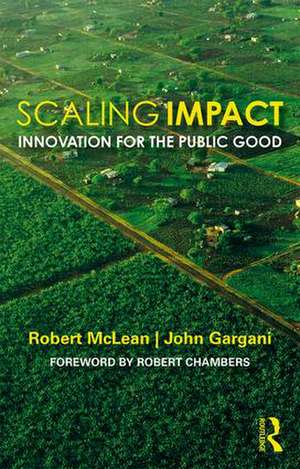Scaling Impact: Innovation for the Public Good
Autor Robert McLean, John Garganien Limba Engleză Paperback – 24 mai 2019
For organisations and individuals working to change the world for the better, scaling impact is a common goal and a well-founded aim. The world is changing rapidly, and seemingly intractable problems like environmental degradation or accelerating inequality press us to do better for each other and our environment as a global community. Challenges like these appear to demand a significant scale of action, and here the authors argue that a more creative and critical approach to scaling is both possible and essential.
To encourage uptake and co-development, the authors present actionable principles that can help organisations and innovators design, manage, and evaluate scaling strategies. Scaling Impact is essential reading for development and innovation practitioners and professionals, but also for researchers, students, evaluators, and policymakers with a desire to spark meaningful change.
| Toate formatele și edițiile | Preț | Express |
|---|---|---|
| Paperback (1) | 345.35 lei 6-8 săpt. | |
| Taylor & Francis – 24 mai 2019 | 345.35 lei 6-8 săpt. | |
| Hardback (1) | 1000.27 lei 6-8 săpt. | |
| Taylor & Francis – 29 mai 2019 | 1000.27 lei 6-8 săpt. |
Preț: 345.35 lei
Nou
Puncte Express: 518
Preț estimativ în valută:
66.10€ • 68.75$ • 55.39£
66.10€ • 68.75$ • 55.39£
Carte tipărită la comandă
Livrare economică 13-27 martie
Preluare comenzi: 021 569.72.76
Specificații
ISBN-13: 9781138605565
ISBN-10: 1138605565
Pagini: 256
Ilustrații: 2 Tables, black and white; 21 Line drawings, black and white; 7 Halftones, black and white; 28 Illustrations, black and white
Dimensiuni: 138 x 216 x 15 mm
Greutate: 0.35 kg
Ediția:1
Editura: Taylor & Francis
Colecția Routledge
Locul publicării:Oxford, United Kingdom
ISBN-10: 1138605565
Pagini: 256
Ilustrații: 2 Tables, black and white; 21 Line drawings, black and white; 7 Halftones, black and white; 28 Illustrations, black and white
Dimensiuni: 138 x 216 x 15 mm
Greutate: 0.35 kg
Ediția:1
Editura: Taylor & Francis
Colecția Routledge
Locul publicării:Oxford, United Kingdom
Public țintă
Postgraduate, Professional, Professional Practice & Development, and UndergraduateCuprins
Part I Scaling Science - An Emerging Paradigm 1. Introduction Part II Four Guiding Principles for Scaling Impact for the Public Good 2. On Guiding Principles 3. Guiding Principle 1: Justification 4. Guiding Principle 2: Optimal Scale 5. Guiding Principle 3: Coordination 6. Guiding Principle 4: Dynamic Evaluation Part III Case Studies 7. Scaling Ecohealth for Chagas disease prevention in Central America 8. Scaling access to justice for survivors of sexual violence 9. Scaling salt reduction policies and programs in Latin America 10. Scaling Southern policy research to a global level: Southern Voice 11. Scaling a nutrition intervention on the market: promoting locally fortified sunflower oil using e-vouchers Part IV Pathways to Scale 12. Pathways to Scale Part V Moving Forward 13. Moving Forward Appendix: Methods Note
Notă biografică
Robert McLean is Senior Programme Specialist in Policy and Evaluation at Canada’s International Development Research Centre. He led the Scaling Science exploration, which underpins this book.
John Gargani is Founder and President of Gargani + Company, Inc. based in Berkeley, California. He is Past-President of the American Evaluation Association.
John Gargani is Founder and President of Gargani + Company, Inc. based in Berkeley, California. He is Past-President of the American Evaluation Association.
Recenzii
"Scaling social innovation is the great challenge of our days. Scaling Impact: Innovation for the Public Good contributes a new, eminently useable analytical framework thoughtfully applied to specific case examples that will help the readers in finding their way through the complex challenge of scaling for impact. McLean and Gargani’s four guiding principles for scale, their focus on scaling pathways, their recognition that scaling involves tradeoffs, their concept of dynamic evaluation throughout the scaling process—these are just a few of the important take-aways from this important book. The clarity of their evidence-based analytical approach will appeal to the researcher, the clarity of their recommendations to the practitioner." — Johannes Linn, Senior Non-Resident Fellow, The Brookings Institution and former Vice-President, The World Bank, Washington DC, USA
"This book is a thought-provoking contribution to a wide gap in the evaluation literature that demands urgent attention. The pressure is on for rapid evaluative learning to enable scalable, effective action on prevailing challenges. The authors offer a fresh approach to the concept of scaling and the integration of a flexible form of evaluation to deliver the right kind of information at the right time to amplify benefits to people and planet." — Penny Hawkins, Principal Creative Consulting and former Head of Evaluation, UK Department for International Development, Glasgow and London, UK
"Scaling Impact: Innovation for the Public Good is an important contribution to our understanding of what works in development practice. McLean and Gargani first propose a set of four guiding principles for scaling social innovation, and then proceed to illustrate the relevance of these principles with the help of carefully selected and insightful case-studies. The book will be of great value to scholars and practitioners alike." — Kunal Sen, Director, United Nations University-World Institute for Development Economics Research (UNU-WIDER), Helsinki, Finland
"This book makes a timely and important contribution to filling current knowledge gaps in how best to scale up potentially life-transforming social innovations. Drawing on experience and wisdom garnered from a diversity of settings around the world, it provides valuable insights and principles which will, undoubtedly, light the path forward for those striving to overcome the challenges of scaling, particularly in low- and middle-income settings." — Jimmy Volmink, Dean of the Faculty of Medicine and Health Sciences, Stellenbosch University, Tygerberg, South Africa
"When resources are few, the need is urgent, and solutions are uncertain—how does one scale to create sustainable development? These are the complex questions that Scaling Impact addresses. In doing so, it turns to the Global South to provide an alternative worldview and asks – who decides the change, is the change for social good and will it reach those that are too often left behind? 'Big’ in ideas, the book challenges us to think beyond the conventional and linear approaches for scaling up. It studies emergent pathways, diverse development actors and small catalysts for change, all the while ground-truthing the evidence in unpredictable contexts. By showcasing the core principles underlying the innovations in the Global South, we get a glimpse into an uncharted and exciting journey of development change!" — Sonal Zavari, Vice-President, Community of Evaluators - South Asia and Regional Coordinator, Gender and Equity Network South Asia (GENSA), New Delhi, India
"Through a close look at real-life cases from the global South, the authors have tackled a long-standing challenge in development—how to scale social innovation. By looking beyond traditional approaches to scaling impact, they establish important principles for scaling social innovation, address inherent tensions in the process, and present a framework that opens up options for the user, rather than suggesting a singular path to success. The approach merits serious consideration by those hoping to achieve scale in social innovation." — Fred Carden, Principal, Using Evidence Inc., Ottawa, Canada
"It is recognized that social entrepreneurship can help expedite the achievement of several sustainable development goals, however governments, regulators, and development partners have yet to fully learn how best they can facilitate the growth of such enterprises which pursue social impact. This book is a significant attempt to bridge this gap. It will be an immensely useful text for policy makers, funders, social entrepreneurs and academia." — Vaqar Ahmed, Joint Executive Director, Sustainable Development Policy Institute (SDPI), Islamabad, Pakistan
"Scaling science makes an important contribution to the growing literature on scaling. McLean and Gargani’s juxtaposition of the 'science of scaling' with the 'scaling of science' is particularly welcome as are the nuances they provide for emerging concepts like scaling effects and optimal scaling and the focus the book places on engaging and amplifying the voices of clients, beneficiaries and other stakeholders. Issues touched on in the book that I hope will continue to receive active attention include strategic management of the scaling process, the impact of context (particularly in fragile states) on scaling, the role of intermediary organizations in supporting the scaling process, the distinctions between scaling business and scaling social impact, and the links between sustainability and scale." — Larry Cooley, President Emeritus and Senior Advisor, Management Systems International and President, Society for International Development, Washington DC, USA
"A fascinating book that addresses critical development challenges. Based on several diverse case studies, the book presents the 'Scaling Science' paradigm, providing a set of guiding principles, pathways to scale, navigation strategies, concepts and categories, all illustrated with detailed examples. These are very useful tools for researchers, innovators, development practitioners and all others interested in promoting the use of science, research and social innovations for the public good through scaling social impact." — Osvaldo Feinstein, Professor at the Master of Evaluation, Complutense University of Madrid, Spain and Buenos Aires, Argentina
"Wellcome’s mission is to improve health for everyone. For many years, Wellcome has supported science and health research to generate new knowledge and innovations that will lead to improvements in health. We applaud IDRC for developing a set of guiding principles for scaling science that will help us all to have real world impact and make a real difference in people’s lives." — Chonnettia Jones, Director of Insight and Analysis, Wellcome Trust, London, UK
"In a world where 'more and faster' seems to be the mantra of funders and investors alike, this important book challenges our often naive notion of scale, and reminds us that 'each social innovation in its context requires its own learning and adaptation' and that there is no quick blueprint for scale. While this is not a new revelation to some (remember 'NGOs and The Replication Trap 1989'?) and may be disappointing to others who are under pressure to mindlessly put ever increasing numbers in dashboards, the authors offer a useful middle ground to help practitioners and policy makers embed the art and science of scale in institutional strategies and practice that is both open to learning, surprise and fresh thinking, and yet is anchored and guided by the principles, evidence and lessons of what works in different contexts - and where, in some cases, 'less, slower, and better' may actually be understood and embraced as the right metric for scale. Good luck to us all in implementing this much needed and thoughtful approach to scale!" — Nancy MacPherson, Independent Adviser and former Managing Director, The Rockefeller Foundation, New York, USA
"This book is a welcome respite for down-to-earth reading, providing fresh thinking on scaling for impact. Most interesting aspects are the authors’ perceptions on research for development and positive impacts for people and the environment—aspects often ignored by the academia. The four principles of scaling impact provide solid and fresh approaches for thinking anew. The digest of about 200 cases world-wide and the detailed analyses of five cases represent a wealth of information for researchers and evaluators to ponder on. It is refreshing in its approach to guide how things should be done as in the case of designing, managing and achieving scaling up—more is not necessarily better; some readers may get a feeling of unreality and may consider it a rebuff to the inquiring mind – because it is so different from standard texts. The wide array of examples brought out from Bhutan’s road signs to Ebola in Congo to sexual violence in India bring some home truths and fresh thinking on scaling and approaches. A must read for researchers and evaluators." — Ranjith Mahindapala, President, National Academy of Sciences of Sri Lanka, Colombo, Sri Lanka
"Regardless of whether a person is called a researcher, scientist, innovator, student or none of the above, the insightful and eye-opening experience obtained when reading Scaling Impact will undoubtedly affect one's perception of how we have been scaling science globally. The authors through their writing and evaluation of Southern case studies, have challenged the traditional paradigm where innovations and organisations are scaled for commercial success rather than the impact itself being scaled for public benefit. The origins of science are rooted in a need for people to benefit but as the authors have rightly stated, those who bear impact risks are those people who should be benefitting. The importance of scaling impact through justifying, achieving optimal scale, coordinating and dynamically evaluating are addressed in details that will inspire the reader to think differently about the process of innovation, the benefits of which will be reaped by the people who are being targeted." — Zahra Oliphant, Chief Research Officer, Ministry of Science and Technology, Government of Jamaica Kingston, Jamaica
"Scaling impact is not just a useful book but very interesting too. What works to successfully scale-up programs from small pilots to large scales? Study after study has shown that there is a ‘gap’ in impact between pilot programs and scaled-up programs. McLean and Gargani use real-world examples to show what and HOW impact may be scaled up to benefit our lives. Usefully they also come up with value-filled principles that we can all use for decision making, implementation and learning while planning for scaling programs. I’d recommend it for people interested in program implementation and in evidence." — Jyotsna Puri, Head, Independent Evaluation Unit, Green Climate Fund, Incheon, South Korea
"An eye opener! Particularly for those who have been struggling as researchers, evaluators and practitioners with the challenge of scaling up innovations. The findings of this study focus on four guiding principles of Justification, Optimality, Coordination and Dynamic Evaluation which are significant in the process of scaling impact. However, as practitioners we need to be aware of the interactions, overlaps and coordinated efforts in real life situations which are subject to change over time. Using this framework with a sense of adaptability and stakeholder participation opens the way to Scaling Impact - Innovation for the Public Good. A shift of thinking and doing that will be essential in the context of Sustainable Development Goals (SDGs)." — Mallika Samaranayake, Chairperson, Institute for Participatory Interaction in Development and Founding Member & Past President, Community of Evaluators - South Asia, Colombo, Sri Lanka
"The popularity of the term 'scaling' is not matched by conceptual clarity on what it actually means, which harbors a major risk for superficial use, disillusionment, and doing more harm than good. Rob and John refocus it from 'pushing out as much of a technology as possible' to its core: Innovation for the Public Good. They remind us that scaling does not happen under controlled project conditions but that it is a process that happens in society at its own pace and in, sometimes, unexpected ways." — Lennart Woltering, Expert on Scaling of Innovations for Agriculture, International Maize and Wheat Improvement Center (CIMMYT), Mexico City, Mexico
"This book is a thought-provoking contribution to a wide gap in the evaluation literature that demands urgent attention. The pressure is on for rapid evaluative learning to enable scalable, effective action on prevailing challenges. The authors offer a fresh approach to the concept of scaling and the integration of a flexible form of evaluation to deliver the right kind of information at the right time to amplify benefits to people and planet." — Penny Hawkins, Principal Creative Consulting and former Head of Evaluation, UK Department for International Development, Glasgow and London, UK
"Scaling Impact: Innovation for the Public Good is an important contribution to our understanding of what works in development practice. McLean and Gargani first propose a set of four guiding principles for scaling social innovation, and then proceed to illustrate the relevance of these principles with the help of carefully selected and insightful case-studies. The book will be of great value to scholars and practitioners alike." — Kunal Sen, Director, United Nations University-World Institute for Development Economics Research (UNU-WIDER), Helsinki, Finland
"This book makes a timely and important contribution to filling current knowledge gaps in how best to scale up potentially life-transforming social innovations. Drawing on experience and wisdom garnered from a diversity of settings around the world, it provides valuable insights and principles which will, undoubtedly, light the path forward for those striving to overcome the challenges of scaling, particularly in low- and middle-income settings." — Jimmy Volmink, Dean of the Faculty of Medicine and Health Sciences, Stellenbosch University, Tygerberg, South Africa
"When resources are few, the need is urgent, and solutions are uncertain—how does one scale to create sustainable development? These are the complex questions that Scaling Impact addresses. In doing so, it turns to the Global South to provide an alternative worldview and asks – who decides the change, is the change for social good and will it reach those that are too often left behind? 'Big’ in ideas, the book challenges us to think beyond the conventional and linear approaches for scaling up. It studies emergent pathways, diverse development actors and small catalysts for change, all the while ground-truthing the evidence in unpredictable contexts. By showcasing the core principles underlying the innovations in the Global South, we get a glimpse into an uncharted and exciting journey of development change!" — Sonal Zavari, Vice-President, Community of Evaluators - South Asia and Regional Coordinator, Gender and Equity Network South Asia (GENSA), New Delhi, India
"Through a close look at real-life cases from the global South, the authors have tackled a long-standing challenge in development—how to scale social innovation. By looking beyond traditional approaches to scaling impact, they establish important principles for scaling social innovation, address inherent tensions in the process, and present a framework that opens up options for the user, rather than suggesting a singular path to success. The approach merits serious consideration by those hoping to achieve scale in social innovation." — Fred Carden, Principal, Using Evidence Inc., Ottawa, Canada
"It is recognized that social entrepreneurship can help expedite the achievement of several sustainable development goals, however governments, regulators, and development partners have yet to fully learn how best they can facilitate the growth of such enterprises which pursue social impact. This book is a significant attempt to bridge this gap. It will be an immensely useful text for policy makers, funders, social entrepreneurs and academia." — Vaqar Ahmed, Joint Executive Director, Sustainable Development Policy Institute (SDPI), Islamabad, Pakistan
"Scaling science makes an important contribution to the growing literature on scaling. McLean and Gargani’s juxtaposition of the 'science of scaling' with the 'scaling of science' is particularly welcome as are the nuances they provide for emerging concepts like scaling effects and optimal scaling and the focus the book places on engaging and amplifying the voices of clients, beneficiaries and other stakeholders. Issues touched on in the book that I hope will continue to receive active attention include strategic management of the scaling process, the impact of context (particularly in fragile states) on scaling, the role of intermediary organizations in supporting the scaling process, the distinctions between scaling business and scaling social impact, and the links between sustainability and scale." — Larry Cooley, President Emeritus and Senior Advisor, Management Systems International and President, Society for International Development, Washington DC, USA
"A fascinating book that addresses critical development challenges. Based on several diverse case studies, the book presents the 'Scaling Science' paradigm, providing a set of guiding principles, pathways to scale, navigation strategies, concepts and categories, all illustrated with detailed examples. These are very useful tools for researchers, innovators, development practitioners and all others interested in promoting the use of science, research and social innovations for the public good through scaling social impact." — Osvaldo Feinstein, Professor at the Master of Evaluation, Complutense University of Madrid, Spain and Buenos Aires, Argentina
"Wellcome’s mission is to improve health for everyone. For many years, Wellcome has supported science and health research to generate new knowledge and innovations that will lead to improvements in health. We applaud IDRC for developing a set of guiding principles for scaling science that will help us all to have real world impact and make a real difference in people’s lives." — Chonnettia Jones, Director of Insight and Analysis, Wellcome Trust, London, UK
"In a world where 'more and faster' seems to be the mantra of funders and investors alike, this important book challenges our often naive notion of scale, and reminds us that 'each social innovation in its context requires its own learning and adaptation' and that there is no quick blueprint for scale. While this is not a new revelation to some (remember 'NGOs and The Replication Trap 1989'?) and may be disappointing to others who are under pressure to mindlessly put ever increasing numbers in dashboards, the authors offer a useful middle ground to help practitioners and policy makers embed the art and science of scale in institutional strategies and practice that is both open to learning, surprise and fresh thinking, and yet is anchored and guided by the principles, evidence and lessons of what works in different contexts - and where, in some cases, 'less, slower, and better' may actually be understood and embraced as the right metric for scale. Good luck to us all in implementing this much needed and thoughtful approach to scale!" — Nancy MacPherson, Independent Adviser and former Managing Director, The Rockefeller Foundation, New York, USA
"This book is a welcome respite for down-to-earth reading, providing fresh thinking on scaling for impact. Most interesting aspects are the authors’ perceptions on research for development and positive impacts for people and the environment—aspects often ignored by the academia. The four principles of scaling impact provide solid and fresh approaches for thinking anew. The digest of about 200 cases world-wide and the detailed analyses of five cases represent a wealth of information for researchers and evaluators to ponder on. It is refreshing in its approach to guide how things should be done as in the case of designing, managing and achieving scaling up—more is not necessarily better; some readers may get a feeling of unreality and may consider it a rebuff to the inquiring mind – because it is so different from standard texts. The wide array of examples brought out from Bhutan’s road signs to Ebola in Congo to sexual violence in India bring some home truths and fresh thinking on scaling and approaches. A must read for researchers and evaluators." — Ranjith Mahindapala, President, National Academy of Sciences of Sri Lanka, Colombo, Sri Lanka
"Regardless of whether a person is called a researcher, scientist, innovator, student or none of the above, the insightful and eye-opening experience obtained when reading Scaling Impact will undoubtedly affect one's perception of how we have been scaling science globally. The authors through their writing and evaluation of Southern case studies, have challenged the traditional paradigm where innovations and organisations are scaled for commercial success rather than the impact itself being scaled for public benefit. The origins of science are rooted in a need for people to benefit but as the authors have rightly stated, those who bear impact risks are those people who should be benefitting. The importance of scaling impact through justifying, achieving optimal scale, coordinating and dynamically evaluating are addressed in details that will inspire the reader to think differently about the process of innovation, the benefits of which will be reaped by the people who are being targeted." — Zahra Oliphant, Chief Research Officer, Ministry of Science and Technology, Government of Jamaica Kingston, Jamaica
"Scaling impact is not just a useful book but very interesting too. What works to successfully scale-up programs from small pilots to large scales? Study after study has shown that there is a ‘gap’ in impact between pilot programs and scaled-up programs. McLean and Gargani use real-world examples to show what and HOW impact may be scaled up to benefit our lives. Usefully they also come up with value-filled principles that we can all use for decision making, implementation and learning while planning for scaling programs. I’d recommend it for people interested in program implementation and in evidence." — Jyotsna Puri, Head, Independent Evaluation Unit, Green Climate Fund, Incheon, South Korea
"An eye opener! Particularly for those who have been struggling as researchers, evaluators and practitioners with the challenge of scaling up innovations. The findings of this study focus on four guiding principles of Justification, Optimality, Coordination and Dynamic Evaluation which are significant in the process of scaling impact. However, as practitioners we need to be aware of the interactions, overlaps and coordinated efforts in real life situations which are subject to change over time. Using this framework with a sense of adaptability and stakeholder participation opens the way to Scaling Impact - Innovation for the Public Good. A shift of thinking and doing that will be essential in the context of Sustainable Development Goals (SDGs)." — Mallika Samaranayake, Chairperson, Institute for Participatory Interaction in Development and Founding Member & Past President, Community of Evaluators - South Asia, Colombo, Sri Lanka
"The popularity of the term 'scaling' is not matched by conceptual clarity on what it actually means, which harbors a major risk for superficial use, disillusionment, and doing more harm than good. Rob and John refocus it from 'pushing out as much of a technology as possible' to its core: Innovation for the Public Good. They remind us that scaling does not happen under controlled project conditions but that it is a process that happens in society at its own pace and in, sometimes, unexpected ways." — Lennart Woltering, Expert on Scaling of Innovations for Agriculture, International Maize and Wheat Improvement Center (CIMMYT), Mexico City, Mexico
Descriere
Scaling Impact introduces a new and practical approach to scaling the positive impacts of research and innovation. Inspired by leading scientific and entrepreneurial innovators this book presents a synthesis of unrivalled diversity and grounded ingenuity.























